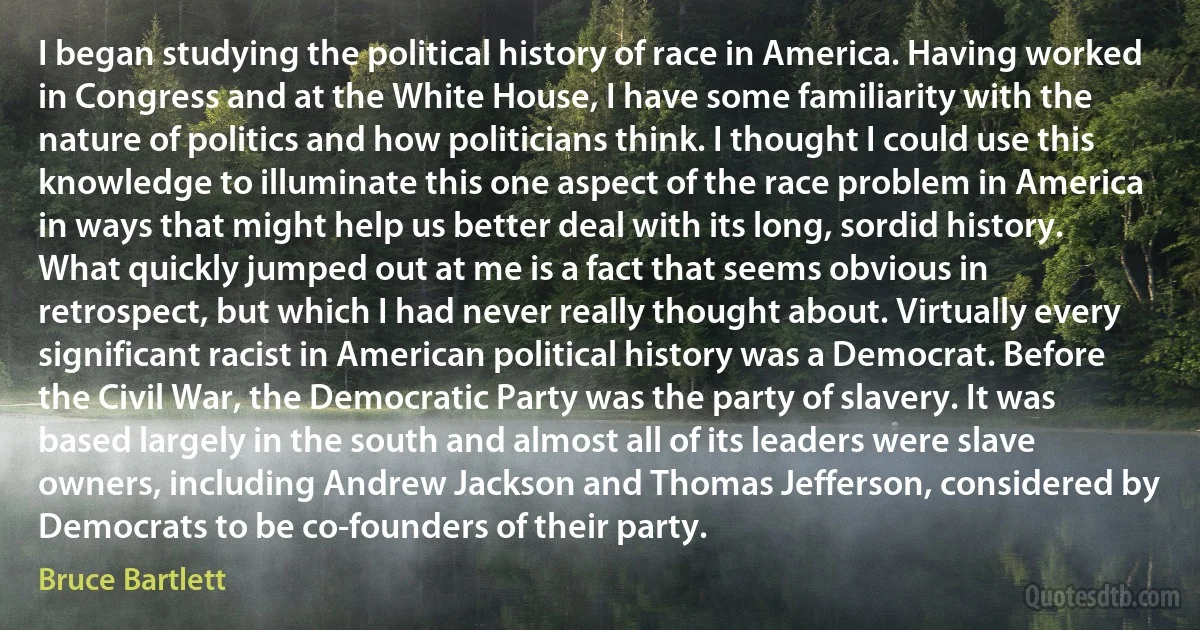
I began studying the political history of race in America. Having worked in Congress and at the White House, I have some familiarity with the nature of politics and how politicians think. I thought I could use this knowledge to illuminate this one aspect of the race problem in America in ways that might help us better deal with its long, sordid history. What quickly jumped out at me is a fact that seems obvious in retrospect, but which I had never really thought about. Virtually every significant racist in American political history was a Democrat. Before the Civil War, the Democratic Party was the party of slavery. It was based largely in the south and almost all of its leaders were slave owners, including Andrew Jackson and Thomas Jefferson, considered by Democrats to be co-founders of their party.
Bruce BartlettRelated topics
almost aspect begin congress deal democrat democratic having help history house knowledge might nature party politics problem race retrospect significant slave thought think use war white jackson racist jefferson waysRelated quotes
We've lost the south, that was one of the biggest fallacies. We went in there and we served the interests of one of our enemies over there, the Iranians. We propped up the Shiites, we overthrew the Sunnis, and the British didn't hold, they left. So there's more peace and less killing in southern Iraq, because all of a sudden we've allowed local control to develop more naturally. Warlords and local people are in charge, and they're more allied with Iran. But this is not a catastrophe, that's why we should deal with the Iranians in a more respectful way: if they had more control of the oil they'd want to sell, what they're gonna do with it, drink it? That's why the balance of power and the idea of self-determination should be worked out by them, not by us. As long as we do it, there'd be resentment and that is the source of the hatred towards us.

Ron Paul
The Negro voter ... had, then, but one clear economic ideal and that was his demand for land, his demand that the great plantations be subdivided and given to him as his right. This was a perfectly fair and natural demand and ought to have been an integral part of Emancipation. To emancipate four million laborers whose labor had been owned, and separate them from the land upon which they had worked for nearly two and a half centuries, was an operation such as no modern country had for a moment attempted or contemplated. The German and English and French serf, the Italian and Russian serf, were, on emancipation, given definite rights in the land. Only the American Negro slave was emancipated without such rights and in the end this spelled for him the continuation of slavery.

W. E. B. Du Bois
We have entered a time of global transition marked by uniquely contradictory trends. Regional and continental associations of States are evolving ways to deepen cooperation and ease some of the contentious characteristics of sovereign and nationalistic rivalries. National boundaries are blurred by advanced communications and global commerce, and by the decisions of States to yield some sovereign prerogatives to larger, common political associations. At the same time, however, fierce new assertions of nationalism and sovereignty spring up, and the cohesion of States is threatened by brutal ethnic, religious, social, cultural or linguistic strife. Social peace is challenged on the one hand by new assertions of discrimination and exclusion and, on the other, by acts of terrorism seeking to undermine evolution and change through democratic means.

Boutros Boutros-Ghali
Twenty-five years ago this Republic was bearing and wearing a triple chain of bondage. Long familiarity with traffic in the bodies and souls of men had paralyzed the consciences of a majority of our people; the narrowing and disintegrating doctrine of State sovereignty had shackled and weakened the noblest and most beneficent powers of the national government; and the grasping power of slavery was seizing upon the virgin territories of the West, and dragging them into the den of eternal bondage.
At that crisis the Republican party was born. It drew its first inspiration from that fire of liberty which God has lighted in every human heart, and which all the powers of ignorance and tyranny can never wholly extinguish. The Republican party came to deliver and to save.

James A. Garfield
Every wolf in sheep's clothing, who pretends to preach the gospel, but proclaims the righteousness of man-selling and slavery-everyone who shoots down negroes in the streets, burns negro school-houses and meeting-houses, and murders women and children by the light of their own flaming dwellings, calls himself a Democrat. Every New York rioter in 1863, who burned up little children in colored asylums-who robbed, ravished and murdered indiscriminately in the midst of a blazing city for three days and nights, called himself a Democrat. In short, the Democratic Party may be described as a common sewer and loathsome receptacle into which is emptied every element of treason, North and South, every element of inhumanity and barbarism which has dishonored the age.

Oliver P. Morton
